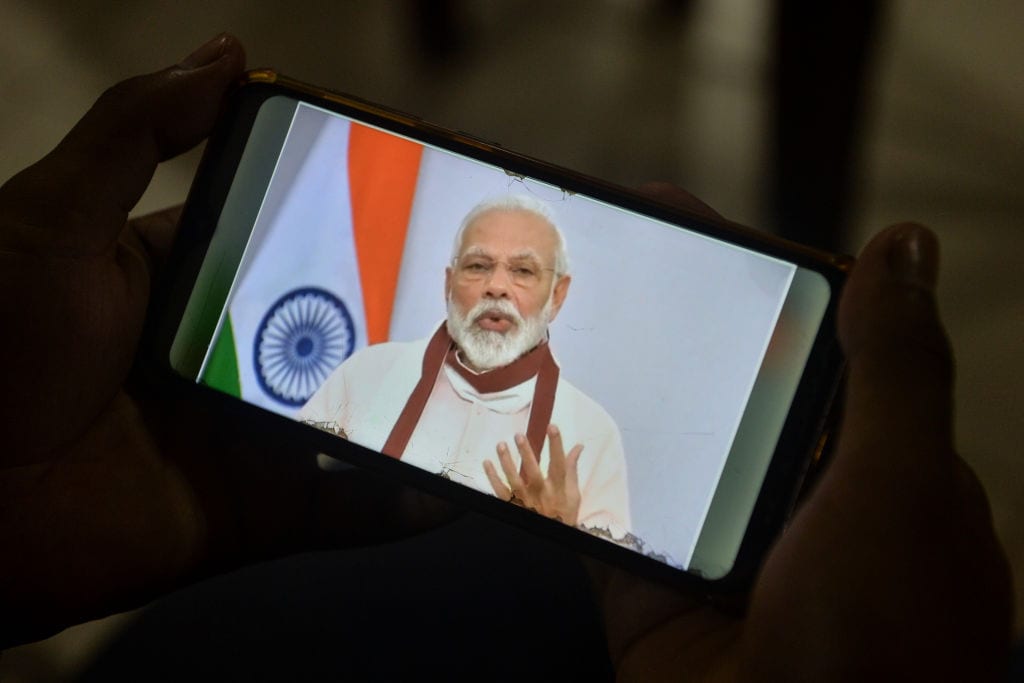- Tuesday, April 15, 2025

By: indiaweekly.biz Staff
Prime Minister Narendra Modi said on Tuesday that India would provide about Rs 20 trillion (£216 billion) in fiscal and monetary measures to support an economy battered by a sweeping weeks-long lockdown to fight the novel coronavirus.
Media reports noted that India’s “Atma-nirbhar Bharat Abhiyan or Self-reliant Bharat Mission” package — 10 per cent of its gross domestic product (GDP) — was almost the size of Pakistan’s GDP.
“In fact, India’s economic relief package for Covid-19 is bigger than Vietnam, Portugal, Greece, New Zealand and Romania,” said the Hindustan Times.
The ruling Bharatiya Janata Party (BJP) described it as “the biggest package India has ever seen”.
India has more than 70,000 cases among its 1.3 billion population and is set to surpass China, the origin of the outbreak, within a week. Modi said strict stay-at-home orders would be extended beyond May 17 with a new set of rules.
In an address to the nation, he said the package was equivalent to 10 per cent of India‘s gross domestic product, and was aimed at the multitudes out of work and the businesses reeling under the prolonged shutdown.
The economic package “will give a new momentum to India’s development journey and put India on the road to self-reliance”, Modi said in a special television address to the nation.
“It is [primarily] for the cottage, small and medium-scale industries,” he added.
The prime minister also noted that “day labourers and migrant workers have suffered much in this period”.
“It is our duty now to do something for them,” he said.
In March, the government said it was providing around Rs 1.7 trillion in direct cash transfers and food security measures, mainly for the poor, but was widely accused of doing too little.
Modi said details of the new package, as well as reforms of land and labour markets, would be released within days
“The package will also focus on land, labour, liquidity and laws,” he added. “It will cater to various sections including cottage industry, medium and small enterprises, labourers, middle class, industries, among others.”
Modi stressed the need for the country to be self-reliant, and for people to buy local products to help the economy.
“The corona crisis has also taught us the importance of local supply chains… we have to now think local,” he said, putting forth the motto of “vocal about local”.
Finance Minister Nirmala Sitharaman, however, clarified that the self-reliance call did not mean India would look only inwards and become an “isolationist country”.
She said the call signalled a confident India which can rest on its strengths and also contribute to the globe.
The president of Indian industry body FICCI, Sangita Reddy, welcomed the package and said it would “address the needs of the poor and needy, MSMEs (micro, small and medium enterprises) and also the industry and common man.”
Analysts said the package was a “much-needed boost for the Indian economy”.
“This is a good and bold step… as different sectors and small-scale businesses were desperate for relief,” said State Bank of Baroda chief economist Sameer Narang.
Economists explained that the new package included the March allocation as well as liquidity measures announced by the central bank worth Rs 6.5 trillion.
“Headline announcement looks positive. Would include around Rs 6.5 trillion rupees already done by RBI (Reserve Bank of India) and the first package. So, the additional is Rs 13.5 trillion rupees,” said Sandip Sabharwal, a Mumbai-based fund manager.
“It doesn’t match the gross borrowing details of the government so we need to look at details. Headline number should, however, excite the markets near-term.”
Last week, India increased its borrowing programme for the year to Rs 12 trillion from Rs 7.8 trillion to fund some of the expenses.
ECONOMY SLOWING, SPENDING RISING
Even before the pandemic, India‘s growth was slowing and public finances were strained because of poor tax collection and higher spending.
Last month, the ratings agency Fitch said India‘s sovereign rating could come under pressure if its fiscal outlook deteriorates further as the government tries to tackle the coronavirus crisis.
Modi said the reforms of the land and labour markets were intended to make India more competitive and a big player in global supply chains, some of which could shift away from China after the pandemic.
Business leaders say potential investors often choose Vietnam, Thailand or Bangladesh ahead of India because of the time required to buy land for factories, restrictive labour laws and higher borrowing costs.
“These reforms will promote business, attract investment, and further strengthen ‘Made in India‘,” Modi said.
Governments and central banks around the world have unleashed unprecedented amounts of fiscal and monetary support for economies that are reeling from the pandemic.
“India’s response has so far been tepid compared to other key nations and thus the catch-up is welcome and is also the need of the hour,” said Madhavi Arora, lead economist at Edelweiss FX and Rates.
“It needs to be seen how much will be in the form of direct budgetary support to gauge the immediate fiscal hit and the consequent funding sources.”